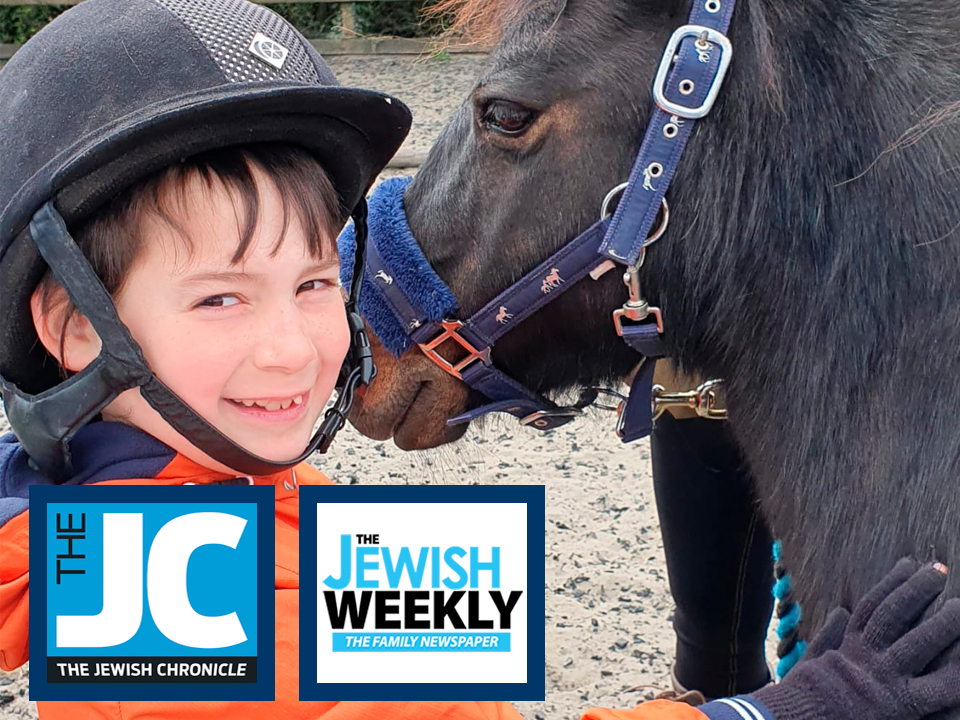


Camp Simcha is investing in horse-power to aid the wellbeing of some of the seriously ill children and siblings they support.
Working with an Equine Therapy organisation, Strength and Learning Through Horses (SLTH), the aim is to provide an alternative form of therapeutic support for some of the emotions that the children may be struggling with.
Camp Simcha Head of Services Daniel Gillis explains: “Sometimes the children we support aren’t able – or don’t want – to put into words the feelings they are coping with.
“The equine therapy uses horses as a means to provide metaphoric experiences to help the children gain understanding and acceptance of their own emotions, especially for those children that are unable to verbalise how they are feeling.”
Clinical Psychologist Dr Jemma Hockley, who is the joint CEO and Therapy Programme Director at SLTH, explains that the programme works subtly and on many levels.
“It’s about giving children the opportunity to think about mental health and wellbeing alongside the physical, by observing the horses, their interactions with the young people and working with the horses’ behaviours.
“The children do not ride the horses, but they build relationships with them on the ground, including grooming and exercising them and training them to be safe around people. With horses you get immediate feed-back and, with a little guidance, it gives the children skills of noticing behaviour and reflection.
“We talk to them about the needs of the horses – such as the need to feel safe, food, companionship, trust, predictability and it helps the children to think about their own needs which they then discuss in a group or with the staff.
“There is also the aspect of how horses cope with things they find difficult which is particularly relevant to some of the Camp Simcha children, who may be facing scary medical procedures and difficult treatments – or siblings who are coping with all sorts of worries.”
Dr Hockley and her team work with the young people helping them to understand how to manage anxiety in horses and at the same time helping them think about how to cope when they are faced with an anxiety-inducing situation themselves.
“We explain to the children that the horses are designed to be attuned to their own anxiety – it’s a warning system for them. When we are working with young people who are struggling with anxiety it helps to normalise it for them – in fact a lot of the work we do focuses on normalising emotions the young people are experiencing and helping them not to feel that these emotions are problematic.”
Equine therapy also looks at peer relationships, which can be a particular issue for seriously ill children who have missed a lot of school.
The time they spend with us is fun, but it is also with new people, so they are developing relationships and are part of a group; this is something many have avoided and are fearful of.”
Eleven-year-old Josh Jacobs from Hertfordshire, whose sister Abigail is being treated for cancer, has been attending the therapy over the last few weeks and his parents have really noticed a positive impact.
“He is much calmer generally,” says his mother, Lara. “We have particularly seen it in how he is with his younger sister. He is more grown up with her and arguing less – and I have noticed how much more responsible he seems too, holding her hand when we cross the road and taking care.
“Josh found it very difficult when Abigail was first diagnosed and I was staying in the hospital with her. He felt very angry with her and with the situation, but because he has some additional needs, he is not the kind of child who would have really benefited from therapy, or even had the patience to sit and chat to someone.
“The equine therapy has been great because he was so happy to have something just for him – and to be the one who feels special. He goes there with a big grin on his face and is still grinning when we collect him at the end.”